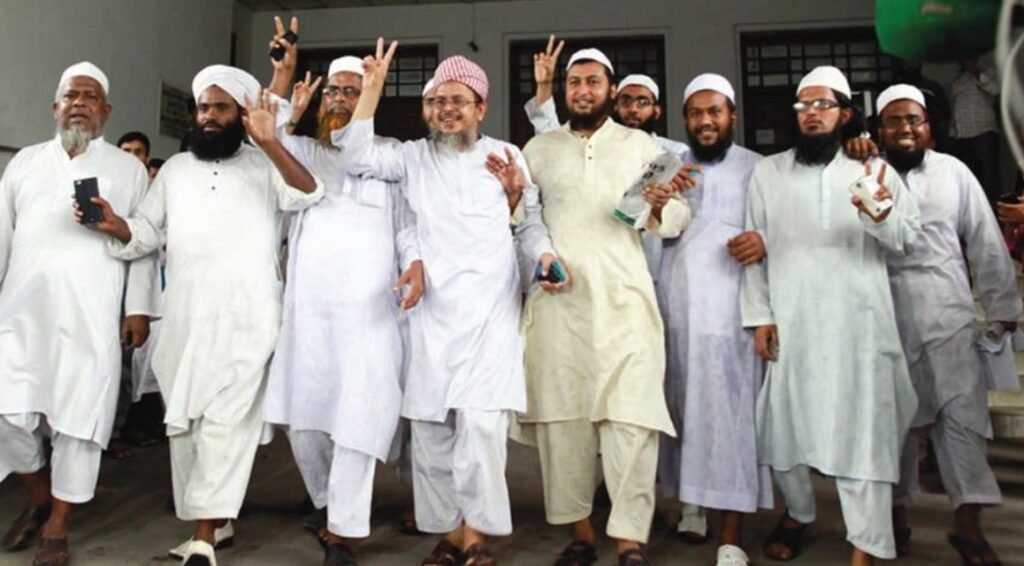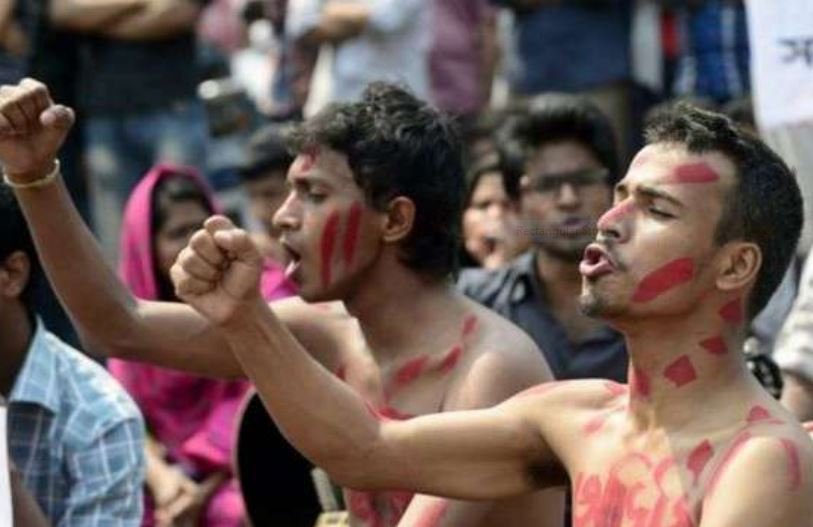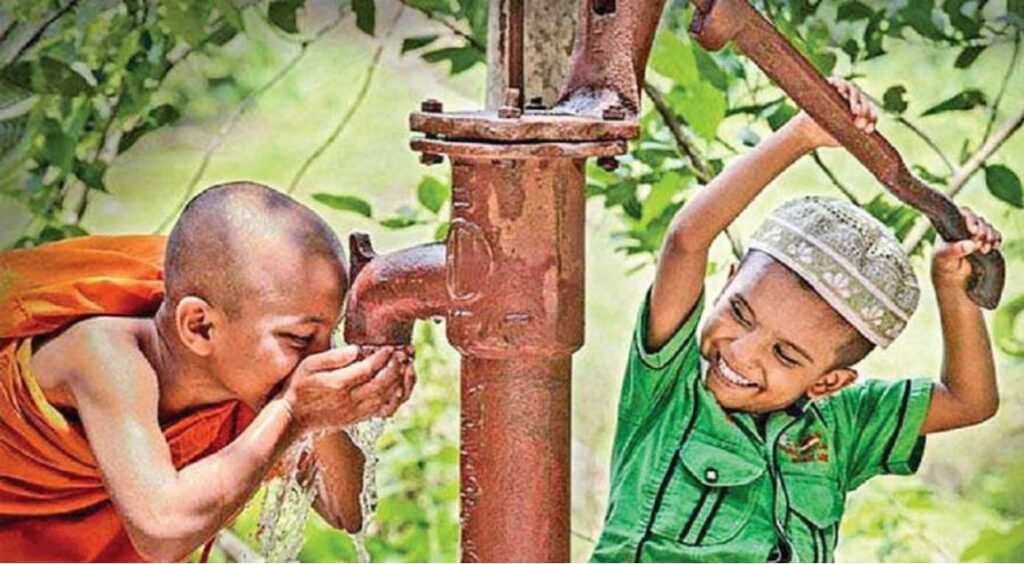There might have many reasons behind the outbreaks of communal violence in our country on different occasions. Various questions are being posed by social analysts – are these attacks really some spontaneous reactions of the Muslim or Hindu communities? Or the attacks are well-orchestrated by some groups who always look for an excuse for their interests? MOHAMMAD RAFIUL HASSAN writes in details observing the nature and characteristics of the communal violence in Bangladesh and beyond
Religion-based politics, which is a very much reality of the present time, started since the British period. When this subcontinent became independent in 1947, a number of territorial borders were built with religious tension remaining the same. A large number of Hindu, Muslim, Buddhist and Christian communities were scattered across the newly independent regions and religion was very important part of their lives and still it is. Although two different states were created on the basis of religion, the conflict of religion does not stop yet.
YOU CAN ALSO READ: DEPUZZLING INDO-PACIFIC ECONOMIC
FRAMEWORK FOR BANGLADESH

Communal violence becomes a regular event in this part of the world. Recent incidents of violence against minority communities in Bangladesh and India are some examples. Violence has increased of late across the subcontinent. This problem is not new but a hundred-year-old across the subcontinent. But why is it not being solved? Even after dividing the country on the basis of religion, this problem could not be curbed.
In case of Bangladesh, many raise a question – were these attacks a spontaneous reaction of some Muslim communities? Or the attacks are well-orchestrated by some groups who always look for an excuse for their interests? Every time after the incident there are protests, lawsuits but the recurrences does not stop. Recently, the government and administration have taken a strict stand. There were protests all over the country. But the recurrence of the incidents is yet to stop. Why? It requires some analysis.
EMERGENCE OF COMMUNAL & RELIGION-BASED POLITICS
Communalism is a concept born in the second half of the nineteenth century of the British period, which took on a fully political character from the beginning of the twentieth century. For this reason, communalism is not just a religious matter. Communal people cannot be said to be religious as well. It arises out of the conflict of interests of the people of one religious’ community with those of another religious’ community in particular situations. Communal politics was born out of this conflict in British India. The two-nation theory and communal conflict created from there. After the independence of India and Pakistan, Hindu-Muslim relations further deteriorated through this conflict.

on the state religion of Bangladesh.
Through the liberation war, the independent Bangladesh state was established by burying the two-nation theory. In 1972, Bangabandhu gave Bangladesh one of the best constitutions in the world very quickly. After the assassination of Bangabandhu in 1975, the Zia-Ershad military regime raised the corpse of the two-nation theory from the grave and spread the poison of religious communalism. The bearers of the two-nation theory have been re-established in statepolitics. Regrettably, anti-independence, religionbased political forces emerged under various names, including the BNP and Jatiya Party-created by the military rulers, and re-established Jamaat with their support. In this context, the power of non-communal ideology within the political parties has gradually started to decline. As a political strategy to prove oneself as ‘devout’, ‘good Muslim’, ‘good Hindu’ etc., the distinction between religion and bigotry is being erased. The poison tree of communalism is being planted.
On the other hand, Indian politics has become terribly communal. Because of this, there are big, powerful and dangerous political parties like Rashtriya Swayamsevak Sangh (RSS), Bharatiya Janata Party (BJP), Vishwa Hindu Parishad, Bajrang Dal, and Shiv Sena which are constantly active in chanting Hindu supremacy and spreading venom of communal violence against minorities.
WHEN COMMUNALISM IS AN IDIOLOGY
When communalism becomes a dogma, it results in violent riots. Central to this doctrine is the idea that the interests and rights of the majority are more just than those of the minority. After living side by side in the same country for thousands of years, unfortunately the minority is still seen as separate, illegal and inferior in the eyes of the majority.
Obviously, religion is a major factor in community formation. Despite all the inherent differences, a kind of unity developed around religion. But religion is only a catalyst, a bridge to achieve economic and political interests. If we look at India – the basic problems of Hindus and Muslims are identical. Poverty, discrimination, underdevelopment, ecological imbalance, corruption or the application of law— all these affect Hindus and Muslims more or less equally. But the majority is always keen in making the minorities their rival for the sake of political gain. The way the current ruling class of India is using Hindu supremacy as a trump card to consolidate its power, it is clear that they are benefited politically from communal violence. Gujarat riots is the best example of this.
On the other hand, communal tension is also present in Bangladesh, but it has not become an organized doctrine in the hands of religion-based politics. There is intolerance towards Hindus, but there is no deliberate attempt to make them an enemy. However, attempts are sometimes made to create religious frenzy, albeit on a limited scale.
IDENTITY POLITICS
American political scientist Francis Fukuyama recognizes that self-esteem operates in each person based on his or her various identities. Religion, caste, economic class, ethnicity, gender, sexual behaviour— everything in the world has some sort of identity. That is why they want their identity to be recognized by the society or the state. No matter how small his position in a state may be in terms of numbers or influence, he wants recognition. When he doesn’t get it, a kind of dissatisfaction prevails in him.

Capitalizing on that discontent, today’s politicians stoke the violence. As a result, it is possible to do many things by encouraging or instigating people with this feeling in any crisis. The politics of the subcontinent is getting used to encouraging such mass frenzy. They must take responsibility for the culture of using religion in communal conflict to create mass madness.
NEGATIVE IMPACT OF REGIONAL AND INTERNATIONAL POLITICS
Political Islam has also emerged as a reaction to the ‘Muslim hatred ‘dual policy’ and ‘Islamophobia’ of the western world. Again, the United States is the bearer of this political Islam. They are also supposedly behind the creation of Al Qaeda-IS-Taliban. This international situation has also affected our country. People who are religiously or ethnically majority in one South Asian country are minority in another country. As a result, discrimination or persecution of religious and ethnic minorities in any country in South Asia has an unlimited impact on other countries. Hence, Bangladesh has to deal with the negative impact of international and regional politics.
SECTARIAN POLITICS AGAINST BANGLADESH
In Assam, the politics of “Drive foreigners” has been going on for several decades, considering only the poor Bengali-speaking Muslims as “Bangladeshi outsiders”. National Register of Citizens (NRC) was the result of that heinous politics, but no trace of ‘forty lakh Bangladeshi Muslims’ was found. Same politics is going on in Tripura and West Bengal. It is definitely an unbearable reality for Dhaka that Bangladesh becomes a topic of discussion when elections are held in West Bengal, Tripura and Assam. It is also not desirable to attempt to build a systematic worldwide propaganda movement against any country.

Bangladesh is currently a victim of such a narrow intercontinental politics. But Bangladesh never went to Geneva or New York about the plight of Muslims in Assam-Tripura-West Bengal. It is a rare diplomatic precedent that the Bangladesh government is still silent on the anti-Bangladesh campaign going-on in Assam. But it is very difficult to hold on to the wounded emotions of 17 crore people of Bangladesh.
BANGLADESH PERSPECTIVE: ARE WE A COMMUNAL HATRED NATION
For some times, there have been incidents of attacks on people of Hindu community in some parts of Bangladesh. It appears the attacks on the Hindu community to be a communal violence, but in reality, it cannot be called a communal attack. Because it has been seen that in this kind of violence, some local powerful persons gather people and attack the Hindu community, saying that they hurt the religious sentiments of Muslims. Their houses, temples, shops were looted. In some incidents, they burned their houses and drove them out and tried to grab their property. They not only attack the Hindu community, but also the small ethnic groups such as Santal, Garo, Chakma, Marma, Tripura etc. to grab their lands, properties and houses. Muslims also fall in their prey where they are weak. Because creed, caste or religion etc. are irrelevant to looters.
There is no communal extremism among the general population of Bangladesh. The ruling class of Bangladesh is not blatantly communal like India. The Islamic parties of the country are mainly Islamic fundamentalists. Their declared goal is to establish governance in the country based on Quran and Sunnah.
Their enemies are not Hindus or other religious sects but their enemies are progressives and seculars. Although the ruling party of Bangladesh proclaims Islam as the state religion, in reality they do not try to establish any religious authority. Therefore, those who compare the attacks on the Hindu community in Bangladesh with the religious activities of the Taliban are extremely ignorant. That is because wherever the Hindu community has been attacked so far, it can be seen that the attackers are locally powerful persons. They create situations and attack them locally for their own interests and to seize and loot land and other properties. Although they are few in number, they attack wherever they get the opportunity.
In Bangladesh, like Muslims, Hindus also occupy high positions in the government. About 8 percent of the total population of Bangladesh belongs to the Hindu community. Their share in jobs, trade etc. is more than this rate. If there was religious sectarianism in Bangladesh, this situation would not have been possible for the followers of Hindu people. Therefore, before calling these attacks communal, it is necessary to see whether there is a communal situation prevails in Bangladesh or not. If someone calls the people of Bangladesh communal extremist without looking at the existing social situation, then it will be nothing but a big propaganda against the country.
POLITICS BEHIND THE SCENES
Mainstream political parties in the country have been virtually silent on the issue of religion-based conflict, mainly for strategic reasons. What could be the strategic reasons? First, when questions of religion are involved, parties dependent on vote politics considering it safer to be driven by public reaction than to take a leadership role. But the unfortunate truth is that religion is a touchy subject, and religious sentiments are mostly exploited for political gain. Some argue that the apparent increase in the practice of religion in the country is accompanied by sectarian tendencies among the majority. However, wherever communal tendencies are visible, there are allegations of behind-the-scenes political links. But there is no communalism among the general population of Bangladesh. Therefore, there is very little precedent for public participation in these religious frenzy.
A HOPE FOR COMMUNAL HARMONY
After the incident of communal violence in Bangladesh, many intellectuals of the country made statements, many wrote articles condemning and protesting the incidents. Even the Muslim youth of the villages are among those who stood against the attack. This presents a very positive picture of the country people that they are against communal violence. In contrast, “We don’t know anything, we haven’t heard anything,” Hindu villagers bluntly told a visiting New York journalist after the horrific 2002 riots in Gujarat. This is the difference between communal violence in Bangladesh and that of in India. The Muslim majority of Bangladesh does not turn a blind eye when their neighbouring Hindus are attacked, they do not deceive themselves by saying ‘we don’t know’, or ‘we have not heard’. This attitude of the general people is the hope of Bangladesh.

INTERNATIONAL COMMITMENT TO END COMMUNAL VIOLENCE
The problem of communalism is not a single coun – try’s headache, nor a bilateral problem, rather it is a collective responsibility of South Asia. The solu – tion should be a multilateral effort. We should learn from the incidents in Middle East and Africa. Unable to stop the ethnic and religious incitement in the re – gions, many townships have been destroyed. In the name of controlling the situation, powerful states have profited from this. To save South Asia from the same fate, SAARC-based joint initiatives are now necessary. A concerted effort to suppress religionbased politics is indispensable immediately.
The statement of Prime Minister Sheikh Hasina on the communal conflict deserves to be discussed in this regard. She said on October 14, 2021 that, “Such things should not be done (in India) which has an impact on our country.”
When the premier expressed concern that communal injustice in one country of the subcontinent could create repercussions in another country, she was pointing out a harsh reality. The essence of her speech was that the security of minorities in India should be given importance for the sake of the security of minorities in Bangladesh. This statement was an open acknowledgment of this inter-region problem. By speaking this truth as a politician, she also showed the right way to deal with the communal crisis in the subcontinent.

That is why we have seen that when the incident of Cumilla is being fumigated in India, a policy of strict patience is seen in Bangladesh at the public and private level about the incident of Tripura. However, the reality is that the extent and brutality of the incident is spreading concern in the government and public. The backlash of such reality is undesirable, but what is the way to prevent it? Sheikh Hasina’s suggestion is relevant in this sense. Sectarianism and sectarian politics must be stopped at all sources.
Regardless of the recent situation in the subcontinent including Bangladesh, this nuisance needs to be resolved through national and international unity. This is not a matter of dealing with minorities alone. Faith, trust, connection, communication, harmony, and unity need to be established among people of all religions. Politics drives society, so the political leadership should remove their weakness, duality and stand united against all kinds of bigotry and reaction. The use of religion in politics in the name of tactic should be stopped. Initiatives should be taken to bring South Asian political parties, leadership and governments together to revive communal harmony throughout South Asia. Only then can we hope to break free from the scourge of communalism in the region.


